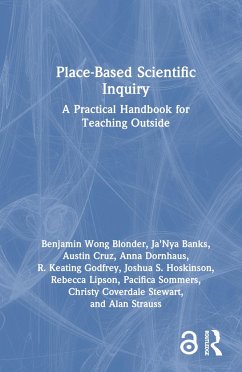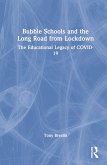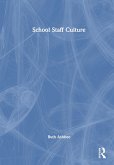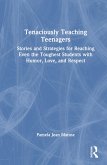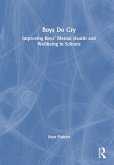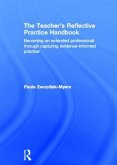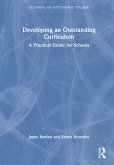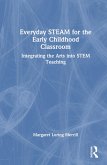Benjamin Wong Blonder, Alan Strauss, Ja'Nya Banks, Austin Cruz, Anna Dornhaus, R Keating Godfrey, Joshua S Hoskinson, Rebecca Lipson, Pacifica Sommers, Christy Stewart
Place-Based Scientific Inquiry
A Practical Handbook for Teaching Outside
Benjamin Wong Blonder, Alan Strauss, Ja'Nya Banks, Austin Cruz, Anna Dornhaus, R Keating Godfrey, Joshua S Hoskinson, Rebecca Lipson, Pacifica Sommers, Christy Stewart
Place-Based Scientific Inquiry
A Practical Handbook for Teaching Outside
- Gebundenes Buch
- Merkliste
- Auf die Merkliste
- Bewerten Bewerten
- Teilen
- Produkt teilen
- Produkterinnerung
- Produkterinnerung
Providing a contemporary perspective on how to do scientific inquiry in ways that can make students' experiences better, this book draws on authentic inquiry, engaging with communities, and teaching through project-based learning, to help students design and carry out scientific inquiry projects that are grounded in their local places.
Andere Kunden interessierten sich auch für
![Bubble Schools and the Long Road from Lockdown Bubble Schools and the Long Road from Lockdown]() Tony BreslinBubble Schools and the Long Road from Lockdown167,99 €
Tony BreslinBubble Schools and the Long Road from Lockdown167,99 €![School Staff Culture School Staff Culture]() Ruth AshbeeSchool Staff Culture160,99 €
Ruth AshbeeSchool Staff Culture160,99 €![Tenaciously Teaching Teenagers Tenaciously Teaching Teenagers]() Pamela Jean MatuszTenaciously Teaching Teenagers160,99 €
Pamela Jean MatuszTenaciously Teaching Teenagers160,99 €![Boys Do Cry Boys Do Cry]() Matt PinkettBoys Do Cry160,99 €
Matt PinkettBoys Do Cry160,99 €![The Teacher's Reflective Practice Handbook The Teacher's Reflective Practice Handbook]() Paula Nadine Zwozdiak-MyersThe Teacher's Reflective Practice Handbook186,99 €
Paula Nadine Zwozdiak-MyersThe Teacher's Reflective Practice Handbook186,99 €![Developing an Outstanding Curriculum Developing an Outstanding Curriculum]() Jayne BartlettDeveloping an Outstanding Curriculum185,99 €
Jayne BartlettDeveloping an Outstanding Curriculum185,99 €![Everyday Steam for the Early Childhood Classroom Everyday Steam for the Early Childhood Classroom]() Margaret Loring MerrillEveryday Steam for the Early Childhood Classroom160,99 €
Margaret Loring MerrillEveryday Steam for the Early Childhood Classroom160,99 €-
-
-
Providing a contemporary perspective on how to do scientific inquiry in ways that can make students' experiences better, this book draws on authentic inquiry, engaging with communities, and teaching through project-based learning, to help students design and carry out scientific inquiry projects that are grounded in their local places.
Hinweis: Dieser Artikel kann nur an eine deutsche Lieferadresse ausgeliefert werden.
Hinweis: Dieser Artikel kann nur an eine deutsche Lieferadresse ausgeliefert werden.
Produktdetails
- Produktdetails
- Verlag: Taylor & Francis
- Seitenzahl: 276
- Erscheinungstermin: 12. Juni 2023
- Englisch
- Abmessung: 229mm x 152mm x 18mm
- Gewicht: 562g
- ISBN-13: 9781032434162
- ISBN-10: 1032434163
- Artikelnr.: 67822740
- Herstellerkennzeichnung
- Libri GmbH
- Europaallee 1
- 36244 Bad Hersfeld
- gpsr@libri.de
- Verlag: Taylor & Francis
- Seitenzahl: 276
- Erscheinungstermin: 12. Juni 2023
- Englisch
- Abmessung: 229mm x 152mm x 18mm
- Gewicht: 562g
- ISBN-13: 9781032434162
- ISBN-10: 1032434163
- Artikelnr.: 67822740
- Herstellerkennzeichnung
- Libri GmbH
- Europaallee 1
- 36244 Bad Hersfeld
- gpsr@libri.de
Benjamin Wong Blonder, Ph.D. is an assistant professor and ecologist at the University of California at Berkeley. Ja'Nya Banks, M.Ed. was a special education teacher and now is a doctoral student in education policy at the University of California at Berkeley. Austin R. Cruz, M.A. is an ecologist and educator at the University of Arizona. Anna Dornhaus, Ph.D. is a professor at the University of Arizona studying complex systems and insect behavior. R. Keating Godfrey, Ph.D. is a neuroscientist at the Florida Museum of Natural History with a background in hands-on, outdoor science education and job skills training. Joshua S. Hoskinson, M.S., M.A. is an adjunct faculty member at Tohono O'odham Community College. Rebecca Lipson taught middle school science, math, and special education for eight years and served as the assistant director of education at the University of Arizona Sky School. Pacifica Sommers, Ph.D. is an ecologist and educator at the University of Colorado at Boulder. Christy Coverdale Stewart, M.Ed. has 35 years of experience as a middle and high school science teacher, curriculum specialist, and teacher coach. Alan Strauss, Ph.D. has a background in disability studies and is the director of the University of Arizona's Mount Lemmon Science Center and Sky School.
1. Introduction
1.1. A desert story
1.2. How to use the book
2. Guiding concepts
2.1. Justice-first science teaching
2.2. Place-based teaching
2.3. Inquiry-based teaching
2.4. Outdoor teaching
2.5. Centering student identity
2.6. Meeting the Next Generation Science Standards (NGSS)
2.7. Learning beyond the NGSS
2.8. Decolonizing teaching
2.9. Linking to Indigenous science
3. Setting scope and expectations
3.1. Your role as teacher
3.2. Choosing a topic
3.3. Scheduling and time considerations
3.4. Scaffolding projects into your curriculum
3.5. Cost considerations
3.6. Place considerations
3.7. Student identity considerations
3.8. Universal design, special needs, and disability
4. Acquiring resources and planning safe logistics
4.1. Partnering with volunteers
4.2. Acquiring equipment and collecting data at low cost
4.3. Safety and logistical preparation
5. Getting started via exploration and team building
5.1. Dividing students into groups
5.2. Using notebooks
5.3. Exploration, observation, and sense of place
5.4. Acquiring background information
5.5. Recognizing relationships and responsibility to place
6. Facilitating teams and resolving conflict
6.1. Small group facilitation
6.2. Setting behavioral expectations
6.3. Encouraging positive behavior from individuals
6.4. Encouraging positive behavior from groups
6.5. Team building
6.6. Team contracts and check-ins
6.7. Handling multiple groups
6.8. Getting groups back on track
7. Developing a question and study design
7.1. Facilitating question development
7.2. Building a strong question
7.3. Designing a study and using an anchor chart
7.4. Identifying multiple hypotheses and predictions, or not
8. Planning data collection
8.1. Choosing how much to measure
8.2. Choosing what to do (protocols, checklists, and datasheets)
8.3. Choosing roles
9. Collecting data outdoors
9.1. Practicing collecting data
9.2. Collecting data
9.3. Securing data
10. Analyzing and sense-making
10.1. Drawing conclusions from data
10.2. Visually interpreting results
10.3. Statistical tests
11. Reflecting and recognizing success
11.1. Reflection
11.2. Recognition
12. Sharing outcomes
12.1. How and why to share projects
12.2. Supporting presentation development
12.3. Holding a community event
13. Assessing learning
13.1. Why (or why not) to assess
13.2. Student-centered reflection and feedback
14. Conclusion
14.1. What students and teachers say
14.2. Overcoming common fears
14.3. Starting small and dreaming big
References
1.1. A desert story
1.2. How to use the book
2. Guiding concepts
2.1. Justice-first science teaching
2.2. Place-based teaching
2.3. Inquiry-based teaching
2.4. Outdoor teaching
2.5. Centering student identity
2.6. Meeting the Next Generation Science Standards (NGSS)
2.7. Learning beyond the NGSS
2.8. Decolonizing teaching
2.9. Linking to Indigenous science
3. Setting scope and expectations
3.1. Your role as teacher
3.2. Choosing a topic
3.3. Scheduling and time considerations
3.4. Scaffolding projects into your curriculum
3.5. Cost considerations
3.6. Place considerations
3.7. Student identity considerations
3.8. Universal design, special needs, and disability
4. Acquiring resources and planning safe logistics
4.1. Partnering with volunteers
4.2. Acquiring equipment and collecting data at low cost
4.3. Safety and logistical preparation
5. Getting started via exploration and team building
5.1. Dividing students into groups
5.2. Using notebooks
5.3. Exploration, observation, and sense of place
5.4. Acquiring background information
5.5. Recognizing relationships and responsibility to place
6. Facilitating teams and resolving conflict
6.1. Small group facilitation
6.2. Setting behavioral expectations
6.3. Encouraging positive behavior from individuals
6.4. Encouraging positive behavior from groups
6.5. Team building
6.6. Team contracts and check-ins
6.7. Handling multiple groups
6.8. Getting groups back on track
7. Developing a question and study design
7.1. Facilitating question development
7.2. Building a strong question
7.3. Designing a study and using an anchor chart
7.4. Identifying multiple hypotheses and predictions, or not
8. Planning data collection
8.1. Choosing how much to measure
8.2. Choosing what to do (protocols, checklists, and datasheets)
8.3. Choosing roles
9. Collecting data outdoors
9.1. Practicing collecting data
9.2. Collecting data
9.3. Securing data
10. Analyzing and sense-making
10.1. Drawing conclusions from data
10.2. Visually interpreting results
10.3. Statistical tests
11. Reflecting and recognizing success
11.1. Reflection
11.2. Recognition
12. Sharing outcomes
12.1. How and why to share projects
12.2. Supporting presentation development
12.3. Holding a community event
13. Assessing learning
13.1. Why (or why not) to assess
13.2. Student-centered reflection and feedback
14. Conclusion
14.1. What students and teachers say
14.2. Overcoming common fears
14.3. Starting small and dreaming big
References
1. Introduction
1.1. A desert story
1.2. How to use the book
2. Guiding concepts
2.1. Justice-first science teaching
2.2. Place-based teaching
2.3. Inquiry-based teaching
2.4. Outdoor teaching
2.5. Centering student identity
2.6. Meeting the Next Generation Science Standards (NGSS)
2.7. Learning beyond the NGSS
2.8. Decolonizing teaching
2.9. Linking to Indigenous science
3. Setting scope and expectations
3.1. Your role as teacher
3.2. Choosing a topic
3.3. Scheduling and time considerations
3.4. Scaffolding projects into your curriculum
3.5. Cost considerations
3.6. Place considerations
3.7. Student identity considerations
3.8. Universal design, special needs, and disability
4. Acquiring resources and planning safe logistics
4.1. Partnering with volunteers
4.2. Acquiring equipment and collecting data at low cost
4.3. Safety and logistical preparation
5. Getting started via exploration and team building
5.1. Dividing students into groups
5.2. Using notebooks
5.3. Exploration, observation, and sense of place
5.4. Acquiring background information
5.5. Recognizing relationships and responsibility to place
6. Facilitating teams and resolving conflict
6.1. Small group facilitation
6.2. Setting behavioral expectations
6.3. Encouraging positive behavior from individuals
6.4. Encouraging positive behavior from groups
6.5. Team building
6.6. Team contracts and check-ins
6.7. Handling multiple groups
6.8. Getting groups back on track
7. Developing a question and study design
7.1. Facilitating question development
7.2. Building a strong question
7.3. Designing a study and using an anchor chart
7.4. Identifying multiple hypotheses and predictions, or not
8. Planning data collection
8.1. Choosing how much to measure
8.2. Choosing what to do (protocols, checklists, and datasheets)
8.3. Choosing roles
9. Collecting data outdoors
9.1. Practicing collecting data
9.2. Collecting data
9.3. Securing data
10. Analyzing and sense-making
10.1. Drawing conclusions from data
10.2. Visually interpreting results
10.3. Statistical tests
11. Reflecting and recognizing success
11.1. Reflection
11.2. Recognition
12. Sharing outcomes
12.1. How and why to share projects
12.2. Supporting presentation development
12.3. Holding a community event
13. Assessing learning
13.1. Why (or why not) to assess
13.2. Student-centered reflection and feedback
14. Conclusion
14.1. What students and teachers say
14.2. Overcoming common fears
14.3. Starting small and dreaming big
References
1.1. A desert story
1.2. How to use the book
2. Guiding concepts
2.1. Justice-first science teaching
2.2. Place-based teaching
2.3. Inquiry-based teaching
2.4. Outdoor teaching
2.5. Centering student identity
2.6. Meeting the Next Generation Science Standards (NGSS)
2.7. Learning beyond the NGSS
2.8. Decolonizing teaching
2.9. Linking to Indigenous science
3. Setting scope and expectations
3.1. Your role as teacher
3.2. Choosing a topic
3.3. Scheduling and time considerations
3.4. Scaffolding projects into your curriculum
3.5. Cost considerations
3.6. Place considerations
3.7. Student identity considerations
3.8. Universal design, special needs, and disability
4. Acquiring resources and planning safe logistics
4.1. Partnering with volunteers
4.2. Acquiring equipment and collecting data at low cost
4.3. Safety and logistical preparation
5. Getting started via exploration and team building
5.1. Dividing students into groups
5.2. Using notebooks
5.3. Exploration, observation, and sense of place
5.4. Acquiring background information
5.5. Recognizing relationships and responsibility to place
6. Facilitating teams and resolving conflict
6.1. Small group facilitation
6.2. Setting behavioral expectations
6.3. Encouraging positive behavior from individuals
6.4. Encouraging positive behavior from groups
6.5. Team building
6.6. Team contracts and check-ins
6.7. Handling multiple groups
6.8. Getting groups back on track
7. Developing a question and study design
7.1. Facilitating question development
7.2. Building a strong question
7.3. Designing a study and using an anchor chart
7.4. Identifying multiple hypotheses and predictions, or not
8. Planning data collection
8.1. Choosing how much to measure
8.2. Choosing what to do (protocols, checklists, and datasheets)
8.3. Choosing roles
9. Collecting data outdoors
9.1. Practicing collecting data
9.2. Collecting data
9.3. Securing data
10. Analyzing and sense-making
10.1. Drawing conclusions from data
10.2. Visually interpreting results
10.3. Statistical tests
11. Reflecting and recognizing success
11.1. Reflection
11.2. Recognition
12. Sharing outcomes
12.1. How and why to share projects
12.2. Supporting presentation development
12.3. Holding a community event
13. Assessing learning
13.1. Why (or why not) to assess
13.2. Student-centered reflection and feedback
14. Conclusion
14.1. What students and teachers say
14.2. Overcoming common fears
14.3. Starting small and dreaming big
References

